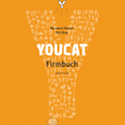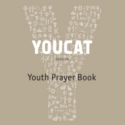
YOUCAT.us
I beg you: Study this Catechism with passion and perseverance. Make a sacrafice of your time for it! Study it in the quiet of your room; read it with a friend; form study groups and networks; share with each other on the Internet.
POPE BENEDICT XVI

The following is a summary of frequently asked questions we have received regarding YOUCAT, along with responses to those questions. Also included below are some general replies to more serious questions a few people have raised.
- What is YOUCAT?
- For whom was YOUCAT written?
- How is YOUCAT different from the Catechism of the Catholic Church and the Compendium of the Catechism?
- YOUCAT have approval by the Church?
- Has the English edition been approved by the Church?
- I read on the internet that YOUCAT has serious theological errors. Is this true?
- I’ve seen an internet petition for a “recall” of YOUCAT. Should I be worried about this?
- I’ve heard that the French, Italian, and English versions all had to be recalled. Is this true?
- What kind of impact is YOUCAT making?
- Will there be support materials for YOUCAT?
- Are there other internet resources related to YOUCAT?
- If YOUCAT is clear, why the controversy?
- Does YOUCAT say that masturbation is okay?
- Is YOUCAT's teaching on homosexuality misleading or unsound?
- Does YOUCAT say that the Bible teaches error?
Q. What is YOUCAT?
A. YOUCAT stands for “Youth Catechism”. It is an official youth catechism recommended by Pope Benedict XVI and compiled under the direction of the primary editor of the Catechism of the Catholic Church, Cardinal Christoph Schönborn of Vienna. Developed with the input of young Catholics, YOUCAT is a faithful and contemporary presentation of the Catholic Faith.
Q. For whom was YOUCAT written?
A. Teens and young adults, both well-formed Catholic young people, with a positive attitude toward their faith and youth immersed in a culture hostile to many Catholic teachings and practices—and who have absorbed many of the false ideas and values of that culture. Well-formed young Catholics will understand what YOUCAT teaches and will be able to go beyond it to other resources, such as the Catechism of the Catholic Church and the Compendium of the Catechism. Less well-formed young people often need to start elsewhere, with something more attuned to responding to their outlook. These young people will find YOUCAT an appealing entryway to a deeper understanding of the Catholic faith. YOUCAT also provides parents, pastors, catechists, teachers, and other adults an attractive teaching tool for reaching young Catholics and young seekers.
Q. How is YOUCAT different from the Catechism of the Catholic Church and the Compendium of the Catechism?
A. YOUCAT is different from these other works in that its presentation, layout, and design are intended specifically for teens and young adults. YOUCAT is also different from the Catechism of the Catholic Church because YOUCAT uses the traditional question and answer format. It’s also different from the Compendium because YOUCAT uses creative, youth-oriented photos and graphics, and is written in a lively, more-youth-engaging style. But like the Catechism and the Compendium YOUCAT reliably presents the Catholic faith. Plus, YOUCAT is keyed to the Catechism, so young people can go deeper in their study of the faith.
Q. Does YOUCAT have approval by the Church?
A. Yes. Our Holy Father Pope Benedict has endorsed YOUCAT. He wrote the foreword to the book. He wrote, “I hope that many young people will let themselves be fascinated by this book.” He goes on to urge: “Study this Catechism! This is my heartfelt desire. Study this Catechism with passion and perseverance. Study it in the quiet of your room; read it with a friend; form study groups and networks; share with each other on the Internet … You need to be more deeply rooted in the faith than the generation of your parents …”.
YOUCAT was also reviewed by the Vatican’s Congregation for the Doctrine of the Faith, the Congregation for Clergy, and the Pontifical Council for the Laity. It received an imprimatur from the Austrian, German, and Swiss bishops’ conferences.
Q. Has the English edition been approved by the Church?
A. As required by the Code of Canon Law (CIC 827§1), YOUCAT has an imprimatur from the diocesan ordinary. For Ignatius Press, the imprimatur was granted through the Archdiocese of San Francisco.
Q. I read on the internet that YOUCAT has serious theological errors. Is this true?
A. No. Quite the opposite is true. YOUCAT is doctrinally reliable. That is why Pope Benedict has endorsed it—along with all the other church authorities mentioned above. All of these individuals or groups regard YOUCAT as worthy of publication and doctrinally sound.
Q. I’ve seen an internet petition for a “recall” of YOUCAT. Should I be worried about this?
A. There have been some critiques of YOUCAT circulating online, based on very selective or otherwise inadequate readings of certain passages. These critiques and petitions have no official approval from any Catholic Church authority and do not represent any authoritative interpretation of the Magisterium. While Catholics may and will have legitimate disagreements from time to time on how best to explain Catholic doctrine, especially when presenting it to young people, these critiques of YOUCAT elevate personal preference or opinion to an unwarranted position and set it at odds with the judgment of the Pope and other church authorities.
Q. I’ve heard that the French, Italian, and English versions all had to be recalled. Is this true?
A. No. Prior to their release to the public, the French and Italian translations had certain problems but not the English version. The first edition of the Italian was recalled and shredded. The French was shredded before it got to market. However, the English translation was accurate. It was carefully reviewed before publication and as noted above, it has an imprimatur from Ignatius Press’ diocesan ordinary.
Q. What kind of impact is YOUCAT making?
A. Pastors, catechists, teachers, young ministers, and others report that young people are responding very positively to YOUCAT. We have heard accounts of conversions, young people coming back to the Church, and even adults being moved by YOUCAT. Youth groups, including large youth rallies, are using YOUCAT. Schools and religious education programs are integrating YOUCAT into their formation and education programs. Parents, godparents, and relatives are buying copies of YOUCAT for young people. And of course hundreds of thousands of copies were distributed free at World Youth Day in Spain. For more information on how YOUCAT is being used and impacting young people, go to www.facebook.com/YoucatUSA.
Q. Will there be support materials for YOUCAT?
A. Yes. Ignatius Press is creating online support resources, including classes based on YOUCAT, as well as a student guide and teacher’s lesson plan book. Other accompanying materials are also in the works, including a YOUCAT app. So keep an eye out for them!
Q. Are there other internet resources related to YOUCAT?
A. Yes. There is the main, international YOUCAT website, www.youcat.org. There is also an Ignatius Press YOUCAT site, www.youcat.us, and a Facebook page, www.facebook.com/YoucatUSA.
Q. If YOUCAT is clear, why the controversy?
A. One reason is that teens are a difficult group to teach and there often is a wide diversity of opinions about how best to approach them. That situation lends itself to controversy. Even when a text is clear, some people with different opinions may criticize it as unclear, because they think this point or that should be phrased differently.
Of course sometimes reasonable people can differ about the best way to communicate a particular truth to young people, especially given the great diversity among young people today. And no catechism is perfect. Differences of opinion will arise for these reasons.
Even so, some people have adopted a hyper-critical stance toward YOUCAT. Perhaps this is due to the fact that early media accounts of the Italian and French translations reported problems with those editions, which has led some people to take a “guilty until proven innocent” approach. For some critics—the most extreme—it is a matter of rejecting or seriously doubting Pope Benedict or Vatican II or the Catechism of the Catholic Church. In some cases, these critics try to conceal their extreme perspectives. In other cases, they openly criticize the Pope and other church leaders. For still other critics, it may be a matter of trying to get attention for themselves and their websites by attacking a catechism approved by the Pope—the “I’m more Catholic than the Pope” approach.
In any case, the claim is false that YOUCAT should be withdrawn because it is “unclear”. While YOUCAT is not perfect or beyond improvement, it is a clear and reliable guide to the Catholic faith for young people today.
Q. Does YOUCAT say that masturbation is okay?
A. YOUCAT calls it "an offense against love" (no. 409). It is false to say YOUCAT approves of masturbation. Let's be clear. YOUCAT doesn't say masturbation is a "bad idea" or "less than the ideal". YOUCAT says it's an offense. While YOUCAT cautions against treating masturbation as the worse sin ("demonizing it"), it also warns against treating it as unimportant ("trivializing it"). This is sound moral theology and common sense.
The whole discussion of masturbation occurs in the context of YOUCAT's presentation of the Church's teaching about sexuality and chastity, including the teaching about sexual relations being for marriage only (nos. 400-417).
Some people object that YOUCAT doesn't specifically call masturbation "sin" or a "grave offense". But YOUCAT expresses the same idea in a different way. It presents masturbation as seriously wrong, but it also explains why it is wrong, in light of the way God created men and women, not simply that it is wrong. It explains that masturbation "makes the excitement of sexual pleasure an end in itself and uncouples it from the holistic unfolding of love between a man and a woman" (no. 409). It explains, "That is why ‘sex with yourself' is a contradiction in terms."
YOUCAT explains how masturbation ultimately leads to unhappiness. What's more, YOUCAT also cross references the Catechism of the Catholic Church, which provides a more detailed, more sophisticated treatment of the subject.
People may have their personal opinions about how they think it best to discuss the subject of masturbation with young people. But it is simply false to claim that YOUCAT approves masturbation or is less than clear about it being seriously wrong.
YOUCAT 409: Is masturbation an offense against love?
Masturbation is an offense against love, because it makes the excitement of sexual pleasure an end in itself and uncouples it from the holistic unfolding of love between a man and a woman. That is why "sex with yourself" is a contradiction in terms. [2352]
The Church does not demonize masturbation, but she warns against trivializing it. In fact many young people and adults are in danger of becoming isolated in their consumption of lewd pictures, films, and Internet services instead of finding love in a personal relationship. Loneliness can lead to a blind alley in which masturbation becomes an addiction. Living by the motto "For sex I do not need anyone; I will have it myself, however and whenever I need it" makes nobody happy.
Q. Is YOUCAT's teaching on homosexuality misleading or unsound?
A. No. YOUCAT's teaching on homosexuality is clear and sound. It teaches that God made man and woman for each other (nos. 64, 65, 400, 415) and that same-sex attraction runs contrary to the order of creation and human nature (nos. 65, 415). It teaches that same-sex acts in any form cannot be approved by the Church (no. 65). It also teaches that homosexual persons should be treated with respect, as all human beings should be shown respect (no. 65), and that homosexual persons should not be unjustly discriminated against (no. 415). Finally, it states that although people with same-sex attraction may suffer as a result of their condition, God is able to bring good out of their situation and bring them to redemption (no. 65).
Despite this clarity of Catholic teaching, some critics claim YOUCAT teaches that homosexuality is natural. That is false. YOUCAT no. 415 states that "all homosexual relations in any form are contrary to the order of creation." Same-sex attraction, according to YOUCAT, leads homosexual persons to "miss out on the physical fruitfulness of the union between man and woman according to human nature and the divine order of creation" (no. 65). Homosexuality can't be "natural" if it is an inclination to actions "contrary to the order of creation" or "human nature".
Some critics have faulted YOUCAT because it does not use the words "intrinsically evil" to describe homosexual acts. But it does express the idea, without using those exact words. To say that homosexual actions are "contrary to the order of creation" certainly entails such actions being "intrinsically evil".
Another criticism: YOUCAT is supposedly sympathetic to homosexuality. This claim is false, because it confuses compassion for those suffering from same-sex attraction with sympathy for homosexuality itself. YOUCAT expresses the Church's pastoral compassion for those struggling with same-sex attraction, recognizing the suffering that can be involved and the need of those who suffer to rely on God's redemption (no. 65). It also repeats the Magisterium's rejection of unjust discrimination against homosexual persons (no. 415—Catechism of the Catholic Church, no. 2358). But these things don't amount to sympathy for homosexuality itself.
The fact is, YOUCAT was not intended to address every possible question on a topic, including homosexuality. It provides cross references to the Catechism of the Catholic Church, and quotations from other church sources, for those who wish to delve deeper into the subject. Nevertheless, what is says on the subject of homosexuality is straightforward and Catholic.
YOUCAT on homosexuality:
Q 65: What about people who feel they are homosexual?
The Church believes that, in the order of creation, man and woman are designed to need each other's complementary traits and to enter into a mutual relationship so as to give life to children. That is why homosexual practices cannot be approved by the Church. Christians owe all persons respect and love, however, regardless of their sexual orientation, because all people are respected and loved by God. [2358–2359]
There is no man on earth who is not descended from a union of a mother and a father. Therefore it is a painful experience for many homosexually oriented people that they do not feel erotically attracted to the opposite sex and necessarily miss out on the physical fruitfulness of the union between man and woman according to human nature and the divine order of creation. Nevertheless, God often leads souls to himself along unusual paths: a lack, a loss, or a wound—if accepted and affirmed—can become a springboard for throwing oneself into the arms of God: the God who brings good out of everything and whose greatness can be discovered in redemption even more than in creation. 415
Q 415: What is the Church's judgment on homosexuality?
God created man as male and female and destined them for each other in a bodily way as well. The Church accepts without reservation those who experience homosexual feelings. They (persons who experience homosexual feelings) should not be unjustly discriminated against because of that. At the same time, the Church declares that all homosexual relations in any form are contrary to the order of creation. [2358–2359]
Q. Does YOUCAT say that the Bible teaches error?
A. YOUCAT does not say that the Bible teaches error. It says that the books of the Bible firmly, faithfully, and without error teach the truth (Q & A no. 14). It says that the books of the Bible were written under the inspiration of the Holy Spirit and have God as their author (Q & A no. 14). It says that the Bible isn't meant to convey precise historical information or scientific findings, and that the human authors of the Bible shared the cultural ideas of their time and were often dominated by their time's errors (Q & A no. 15). Still, everything we must know about God and his way of salvation is found with infallible certainty in the Bible (Q & A no. 15).
It's that last point some people use to claim that YOUCAT's says the Bible teaches error. But of course to say that the human authors of the Bible sometimes suffered under erroneous ideas derived from their time doesn't not mean that the Bible itself teaches error. The Bible must be properly interpreted. Otherwise we wind up making the biblical authors teach things they never intended and we distort the overall message of the Bible. In order properly to interpret the Bible we must, among other things, understand why God inspired its authors to write—not to teach science or history but for our salvation's sake (Q & A no. 15). YOUCAT makes clear that while it is important for people to read the Bible as "a letter from God to each of us", we have to be careful to do so based on Jesus Christ, in light of the faith of the Church (Q & A no. 16). According to YOUCAT, this faith is found in the Bible and the living Tradition of the Church (Q & A no. 12).
YOUCAT's teaching is based on the Catechism of the Catholic Church and Vatican II's Constitution on Divine Revelation Dei Verbum (DV). Here is the section of the Catechism of the Catholic Church YOUCAT quotes and bases its teaching on, a section that also quotes Vatican II (Dei Verbum 11):
The inspired books teach the truth. "Since therefore all that the inspired authors or sacred writers affirm should be regarded as affirmed by the Holy Spirit, we must acknowledge that the books of Scripture firmly, faithfully, and without error teach that truth which God, for the sake of our salvation, wished to see confided to the Sacred Scriptures."(CCC 107).
Below are some key passages from YOUCAT about the Bible referred to above.
Q 14: Is Sacred Scripture true?
"The books of Scripture firmly, faithfully, and without error teach [the] truth … Written under the inspiration of the Holy Spirit, they have God as their author" (Second Vatican Council, DV 11). [103–7]
The Bible did not fall from heaven in its final form, nor did God dictate it to human scribes who copied it down mechanically. Rather "God chose certain men who … made full use of their own faculties and powers so that, though he acted in them and by them, it was as true authors that they consigned to writing whatever he wanted written, and no more" (Second Vatican Council, DV 11). One factor in recognizing particular texts as Sacred Scripture was their general acceptance in the Church. In the Christian communities there had to be a consensus: "Yes, through this text God himself speaks to us—this is inspired by the Holy Spirit!" Which of the many original Christian writings are really inspired by the Holy Spirit has been defined since the fourth century in the so-called canon of Sacred Scriptures.
Q 15: How can Sacred Scripture be "truth", if not everything in it is right?
The Bible is not meant to convey precise historical information or scientific findings to us. Moreover the authors were children of their time. They shared the cultural ideas of the world around them and often were also dominated by its errors. Nevertheless, everything that man must know about God and the way of his salvation is found with infallible certainty in Sacred Scripture. [106–7, 109]
Q 16: What is the right way to read the Bible?
The right way to read Sacred Scripture is to read it prayerfully, in other words, with the help of the Holy Spirit, under whose influence it came into being. It is God's Word and contains God's essential communication to us. [109–19, 137]
The Bible is like a long letter written by God to each one of us. For this reason I should accept the Sacred Scriptures with great love and reverence. First of all it is important really to read God's letter, in other words, not to pick out details while paying no attention to the whole message. Then I must interpret the whole message with a view to its heart and secret: Jesus Christ, of whom the whole Bible speaks, even the Old Testament. Therefore I should read the Sacred Scriptures in the faith that gave rise to them, the same living faith of the Church. [491]
YOUCAT says much more about the Bible than what is summarized and quoted above, but you get the main idea. It distorts the message of YOUCAT to present it as saying that the Bible teaches error.


 English Edition
English Edition DOCAT
DOCAT Confirmation
Confirmation Youth Prayer Book
Youth Prayer Book Study Guide
Study Guide
 Be the First to Know
Be the First to Know

